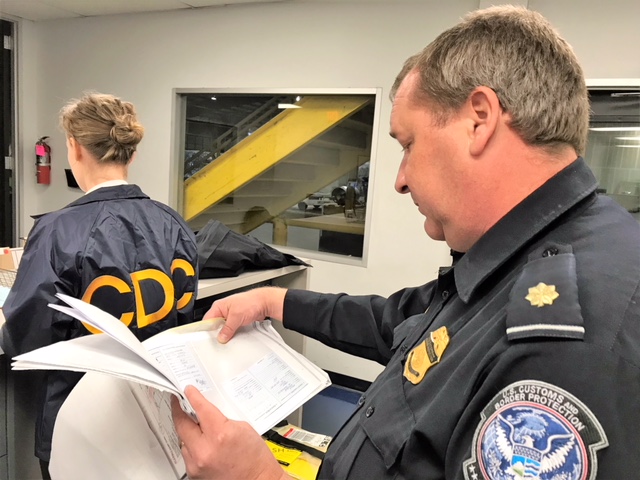Agencies ensure animals meet vaccination, age requirements
HOUSTON – As the holidays approach, gift-givers may feel the pressure to wrap the perfect four-legged gift.

That demand has some importers looking to duck federal regulations in order to bring in the perfect pup this holiday season.
U.S. Customs and Border Protection, Centers for Disease Control and Prevention, and U.S. Department of Agriculture are working to ensure that animals imported to the U.S. meet federal regulations designed to protect consumers and animal health.
“On average, we see 80 dogs imported as cargo weekly,” said Houston Area Port Director Raymond S. Polley. “In the months ahead of the holidays, the number increases about 30 percent.”
When animals are imported to the United States, they may be met by representatives of several government agencies, including CDC representatives who ensure that requirements for dogs and other CDC-regulated animals are met to prevent the importation of disease.
“CBP is CDC’s key partner to protect America’s public health from disease importation,” said Dr. Kendra Stauffer, Veterinary Medical Officer with the CDC’s Quarantine and Border Health Services Branch; “We work with CBP to protect public health at ports of entry by ensuring all dogs are healthy and have proper documentation showing vaccination against rabies when entering the United States.”

to importing dogs to ensure they meet federal regulations.
According to USDA, puppies can be imported for resale or adoption if they are in good health, have been vaccinated for rabies, distemper, hepatitis, leptospirosis, parvovirus and parainfluenza virus, and are at least 6 months of age.
“Sometimes, we see these puppies arriving from terribly long flights,” Polley said. “They are tired and in such a state. Our experienced officers work closely with CDC and USDA to ensure the imported puppies are in good health. This partnership yielded a turnkey operation that is replicated across the country.”
In Houston in 2017, 108 dogs were denied entry and in 2018, 57 dogs were not allowed entry into the country. The work started in Houston has led some importers to try to circumvent authorities by sending their imported puppies through other international airports.
“CBP, USDA and CDC across the country are enforcing federal regulations,” Polley said. “This time of year, we dub our work: Operation Santa Paws. We recognize that importers may try to meet the holiday demand by manipulating the animal’s records. It puts the consumer at risk and it definitely puts the animal at risk.”
A puppy that has not been properly vaccinated could carry diseases that not only affect the animal but other animals as well as people who may encounter that puppy. For more information about importing animals, visit USDA.

